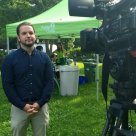A University of Montreal researcher is doing his part to battle the COVID-19 coronavirus outbreak from right here in Quebec.

Virologist Levon Abrahamyan has been studying viruses for decades, and on Thursday, he showed Global News a freezer full of samples of other strains of coronavirus, kept at – 80 C.
They are regularly studyied by Abrahamyan and his students at the University of Montreal veterinary medicine campus in Saint-Hyacinthe.
“You should understand your enemy in order to be able to confront it,” Abrahamyan said.
These days, his focus is a coronavirus that affects pigs.
“We’re working on a porcine epidemic diarrhea virus, which is a coronavirus,” he explained, saying it’s over 90 per cent similar to the COVID-19 coronavirus the whole world is talking about.
He takes animal or human cells, puts them into a container with the virus, and watches how they interact.
“My goal is to find out how the virus enters to the cell, how it replicates, and how it transmits to a new cell,” said Abrahamyan.
He believes the work he does on animals in Saint-Hyacinthe could help find treatments for the coronavirus spreading between humans.
“It is possible to find out a vaccine or anti-viral treatment which could be a pan-coronoviral treatment,” the scientist explained.
Coronaviruses, he explains, have long been a problem for animals, but have only emerged as a big problem for humans in the last 20 or so years.
He said contributing factors include more human travel than ever, more people living in cities and more people interacting with wildlife.
Part of the solution could come from better funding for viral research in animals, Abrahamyan believes.
“To me, it became clear a long time ago we need added funding in animal pathogens, because most emerging diseases are of zoonotic origin,” he explained.
Abrahamyan also wanted to elaborate on why officials are emphasizing the importance of hand-washing, explaining that viruses are protected by a thin, vulnerable membrane.
“That membrane is too sensitive to humidity, temperature, detergents, alcohols, etc.,” he explained, adding that cells near your eyes, nose and mouth are particularly vulnerable to viruses.
Abrahamyan says as spring approaches in Asia, the spread of the COVID-19 coronavirus should slow, because viruses prefer cold, dry conditions.







Comments